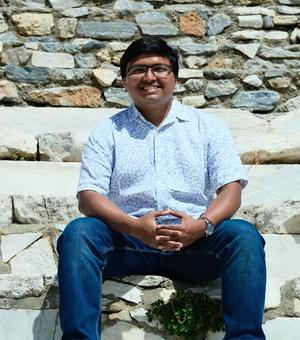Suchintan Das
Research Topic
Crisis, Captivity, and Containment: A History of Encampment and Internment in India (1937-1967)
My research aims to explore the ways through which the camp came to be institutionalized as a mode of captivity and governance, a motif of marginalization and sovereign preponderance, a structure of power but also a site of resistance, during the extended period of transition of the Indian state: from colonial to post-colonial times. I zoom in on diverse historical actors such as rebellious imperial subjects, enemy aliens, prisoners of war, recalcitrant refugees, and ethnic minorities who were (and often continue to be) encamped and interned in times of crisis. I do this to understand the nature of the state, its codes, personnel, and institutions, and to lay bare hitherto unacknowledged ambivalences in international law, national citizenship regimes, and individual and group claims of belonging. I seek to foreground the camp as a weapon of asymmetric warfare and colonial counterinsurgency, as a locus for (re)negotiating metropole-colony relations, as a tool for targeted discrimination, disenfranchisement, and dispossession, and also as a stimulus for generating political opposition and legal innovations. Although my spatial focus is on the Indian subcontinent, this project is very much a social history of 'foreigners' in India, as it is a critical study of the British Empire during the Second World War and the nascent Indian nation-state through the long partition and the 1962 war with China.
Before beginning my DPhil, I did an MSt in Global and Imperial History from the University of Oxford (2022) and a BA (Hons.) in History from St. Stephen's College, Delhi (2021). My graduate studies in Oxford are supported by a Rhodes Scholarship, a Beit Scholarship in Imperial and Commonwealth History, an Oxford-Moussouris-Merton Graduate Scholarship, grants from the Rhodes Class of 1971 Fund, the Colin Matthew Fund, the Beit Fund, the Radhakrishnan Memorial Bequest, the Dacre Trust, and the Frere Exhibition for Indian Studies.
I co-convened the Oxford Transnational and Global History Seminar (TGHS) from 2023-25, the 'New Directions in the History of War' conference (in association with Sir Michael Howard Centre for the History of War, King's College, London) in 2025, and War and Peace: Twentieth-Century Responses from the Global South critical-thinking community at The Oxford Research Centre in the Humanities (TORCH) in 2023.
Select Publications:
- 'Beyond Bandung and Belgrade: Damodar Dharmananda Kosambi, An Indian Voice for World Peace', Peace & Change 0 (2025): 1-9.
- 'Weapons of the Strong: Imperialism and the Beginnings of Wartime Mass-Internment in Cuba and South Africa (1895-1902)', Proceedings of the Indian History Congress 81 (2023): 954-962.
- "‘Next time when you feel compelled to make a confession, please, speak for yourself only and not for me without asking me. I am not a Nazi, definitely not!’: A Vignette on Gendering German Internment in Second World War India", Studies in Humanities and Social Sciences 28/1 (2021) [2023]: 113-125.
- ‘In An Alien City: American Soldiers in Wartime Calcutta (1942-1946)’, Global histories 7/1 (2021): 140-167.
Select Presentations:
- 'New Research in the History of War and the Military' workshop, Arbeitskreis Militärgeschichte and Society for the History of War, 14 March 2025.
- 'Refugees in Global Transit: Encounters, Knowledge, and Coping Strategies in a Disrupted World, 1930s-1950s' conference, German Historical Institute Washington and Max Weber Stiftung, Mumbai, 13-14 February 2025.
- 'New Directions in the History of War' conference, King's College London, 28 June 2024.
- 'Protesting War in the Twentieth Century' symposium, Northumbria University, Newcastle, 13-14 June 2024.
- Women and War Workshop, University of Oxford Centre for Gender, Identity and Subjectivity, 2 June 2023
- 'Countries other than India' Section of the Indian History Congress (81st session), Madras Christian College, 27 December, 2022
- World History Workshop, University of Cambridge, 14 October, 2022
- Global History Student Conference, Freie Universität and the Humboldt-Universität zu Berlin, 26 June, 2022
Book Review:
- "Voice of Palestine: Edward Said's Life and Labours', Economic and Political Weekly 60/46 (15 November 2025)
- "'Born white in a brown city': This book is a poignant memoir of growing up Jewish in Lahore", Scroll.in (2023)
Select Opinion Pieces:
- "Bangabda Blues: Two Arch-Rivals, a Millenial Monarch, and the Quest for a Lunisolar Calendar", Medium.com (2025)
- "Narendra Modi's Government is Falsifying Indian History", Jacobin.com (2024)
- 'Gandhi and Oxford: A Parable for Our Times', Newsclick.in (2023)
- "The Poet in Persia: Revisiting Tagore’s Critique of Aerial Bombardment", Newsclick.in (2023)
- 'Leela Majumdar and Her World of Children: A Tribute on Her 115th Birth Anniversary' Indian Cultural Forum (2023)
- 'Romila Thapar at 90: How to Become a Good Public Intellectual', Economic and Political Weekly 57/14 (2022)
Supervisor: Dr Yasmin Khan




